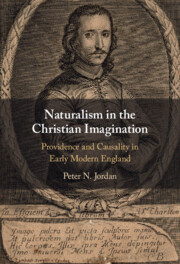Book contents
- Naturalism in the Christian Imagination
- Reviews
- Naturalism in the Christian Imagination
- Copyright page
- Dedication
- Contents
- Acknowledgements
- Part I Setting the Scene
- Part II Expanding the Explanatory Scope of Natural Causality
- Chapter 3 Chance, Lots, and Games
- Chapter 4 Prodigies
- Part III Curtailing the Explanatory Ambitions of Naturalistic Philosophies
- Part IV Conclusion
- Bibliography
- Index
Chapter 4 - Prodigies
from Part II - Expanding the Explanatory Scope of Natural Causality
Published online by Cambridge University Press: 30 June 2022
- Naturalism in the Christian Imagination
- Reviews
- Naturalism in the Christian Imagination
- Copyright page
- Dedication
- Contents
- Acknowledgements
- Part I Setting the Scene
- Part II Expanding the Explanatory Scope of Natural Causality
- Chapter 3 Chance, Lots, and Games
- Chapter 4 Prodigies
- Part III Curtailing the Explanatory Ambitions of Naturalistic Philosophies
- Part IV Conclusion
- Bibliography
- Index
Summary
This chapter looks at prodigies, unusual or unexpected phenomena thought to be personally or communally meaningful. Prodigies were widely thought to be an integral feature of a providentially governed world, and many different occurrences were taken to be communicative signs of God’s disposition toward, or impending judgement of, humanity. Some saw these strange occurrences as miracles and hence instances of divine action, but others dismissed such views as superstitious and misinformed, and conceived of ways to correct them. Following the lead of Francis Bacon, John Spencer was convinced that the explanation of these unusual occurrences should be reformed, and made the case for placing them under the purview of natural philosophy and explaining them naturalistically. This chapter looks at the occurrences that Spencer labelled as prodigies, his strategies for understanding them, the consequences of providing naturalistic explanations of prodigies for the perceived communicative capacities of nature, and the afterlife of Spencer’s analysis among members of the Royal Society
- Type
- Chapter
- Information
- Naturalism in the Christian ImaginationProvidence and Causality in Early Modern England, pp. 72 - 110Publisher: Cambridge University PressPrint publication year: 2022

